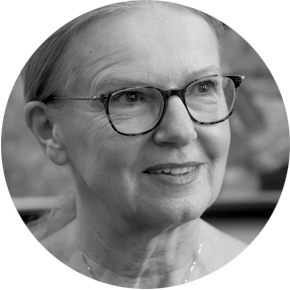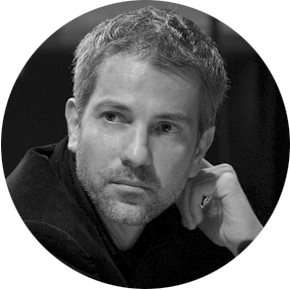The American University of Armenia has been providing quality education in Armenia for 30 years. On its 30th Anniversary AUA launched the “Build a Better Future With AUA” campaign to raise $15 million for the construction and furnishing of a new Science and Engineering Building.
Mediamax spoke to Dr. Karin Markides, the president of the American University of Armenia (AUA) on AUA’s values created during 30 years, as well as its future vision and goals of the capital campaign.
I would like to start our interview with a personal story: why did you decide to join AUA's big family and lead the university?
I'm a professor in analytical chemistry and did my career in that area. But also I was working in different universities in Europe and in America, and then I realized that universities should be and could be engaged more in society. So I became more and more interested to see how I could take part in that. I was the President of Chalmers University of Technology for about 10 years in Sweden, that, of course, triggered me even more, because we were quite successful with what we did together. I thought maybe I could relocate and find a different part of the world to work from. Then I found this opportunity. I’m very happy that I was selected for this position. It's about what universities are. What is a university's role in society? This is what I’m currently working on.
What did you know about Armenia before?
Well, I knew a little bit about Armenia. Of course, I come from Nordic Europe, but my husband is from Greece, and they have a lot in common. His mother grew up with Armenians. She told me a lot of nice stories. So I have that with me. And, of course, I know some of the history and the special situation for the eastern part of Europe, the rich history, the western values, and it's very interesting.
The AUA has launched the “Build a Better Future With AUA” capital campaign. Please, tell us about this campaign and its purpose.
The campaign aims to build a better future and to focus on building some possibilities for laboratories and meeting places that best fit the body of the university.
The campaign is, of course, something that has grown over the past couple of years. I was thinking about what we need to do in the next phase? I really believe that it’s very important that universities can integrate both within and with the surrounding society. So we have a small university, but it's quite broad, representing disciplines all the way from health to business, from science, and engineering to social sciences. If you look a little closer, you can see that its base is very much theoretical and for a good reason. It's a young university, we didn't have the resources to build laboratories, and we didn't have the ability to really connect more with the society around us.
Although I'm hesitant there, because we have something here that is very unique. This is the open education, with its extension out in the different marzes. From a European perspective, it sounds like a dream, if you could have a university that could have these natural connections to the different regions in a country. For many years, we have also built up some trust. Trust is one of the most important things. To build trust takes time and effort. You need to work long term and in a process oriented, goal oriented way, and this is what has been done here. So we can actually now connect all the non-academic activities that we have here with the academics that we offer at the university.
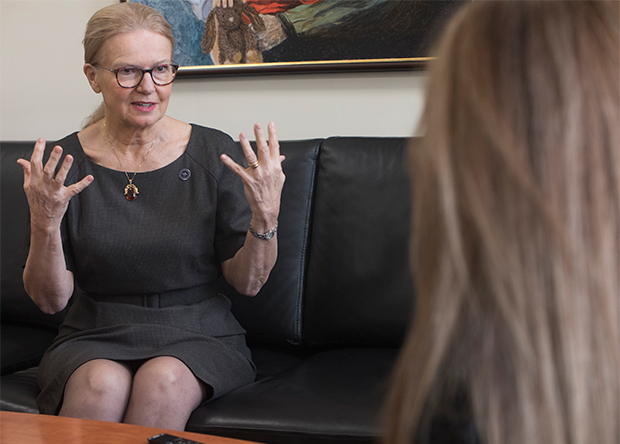 Karin Markides
Karin Markides Photo: Mediamax
In order to do that, we have to build critical mass. The university has a lot of different disciplines, and we also have many programmes, with over 2500 students, but each professor here is more or less isolated by themselves. And they have excellence in their fields but lack a group around them. To be able to connect both internally with other disciplines, and externally with the regions and the challenges over there, we have to build up some critical mass around each professor, each strength. And we also have to build up a place where we can meet, where we can also build some practical hands-on activities. This is important to implement. We need to extend a campus with a Science and Engineering building. And we need to connect students and faculty to the regions with what we call reality labs, which are clusters where both the public and private work together with the University, around challenges that we have in this particular province. And so by connecting across, internally and externally, we can actually put a new dimension in the university that will make everybody be able to work both in the discipline and across with others. So it's a very good way for a small university to be able to act big, to integrate, to be able to transform society, and to build trust. And if we do that, we believe that the resources will come to us. Because there are Armenians all over the world, and of course, they all want their homeland to be prosperous, and have desirable resilience. And when we are small, we have to think smart to be able to make that contribution.
We are turning 30 years old this year, and it’s a good time to take the next step. We had a good "childhood" as a university that has grown up and produced a very good education. Education is great, it's important, but it's not enough. So we have to add research and outreach, to be able to live up to the mission and what the country needs. And so the one thing we have to do here is building a campus where science and engineering can have laboratories, and also meeting places where other actors in society will collaborate and meet with us.
It’s very important for both the building and its student body to connect with their inner and outer environment, as much as possible. Here, a great intersection may be created resulting in new possibilities, new inventions and solutions. So I really don't believe in separating out the different challenge areas or different knowledge areas of a university away from each other. It's very important to find ways how and where they can interact. And, of course, it's not enough to put buildings next to each other. That doesn't make people integrate. So it's a huge responsibility also for us at the university to find tools and incentives that will enable and will attract people, both students and faculties to really come out of their own areas, their own programmes and disciplines to work together. And also to go out and work in the marzes together.
What stage is the donation at right now?
Usually, when you go out and say that you have a campaign, you should have secured about half of what it's needed, in some pledges. And we do have that. And we also have a lot of interest and commitment from people all over the world, both from the public and private sector, that really want this to happen. So we feel secure that when we move on this, we will be able to make it active and tangible.
Why is it important to strengthen science and engineering direction in Armenia? And what is the role of this university in the development of these fields?
Knowledge as such and the forefront of knowledge in different areas are challenged in the world. So, we need to really make sure that we enable our teachers in the universities, not only in the AUA, to show the value of knowledge․ We are actually working with other universities as well. We really want universities as a stakeholder to have some common role in society, of course at the same time we are also competing, because that will make us all better.
Being a chemist myself, I feel very sad when I see the low interest for chemistry and molecular science in Armenia, because you cannot be successful in any area, be it in health care or transportation, energy, whichever it is, without understanding and being interested in molecular science. And of course, mathematics and physics are stronger today but they also need to be much more enhanced. We, as many of the universities in Armenia, are also focusing a lot on artificial intelligence. And that comes natural, in this part of the world, and it's going to grow even more, depending on our ability of connecting the artificial intelligence to different areas.
It's not really a science that should live by itself, it needs to connect to the environmental area, to agriculture, to all these different challenges that we have, in order for these areas to be prosperous, and to bring jobs. So strengthening science and mathematics are very important.
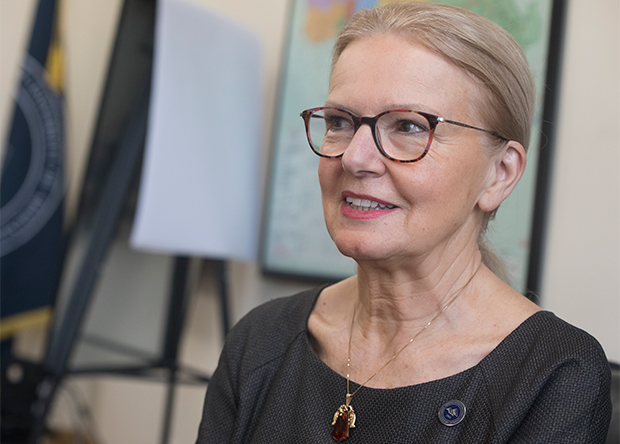 Karin Markides
Karin Markides Photo: Mediamax
Now, engineering, as such, I believe, is an area that should connect science and mathematics with humanity. And that was the aim of engineering in the beginning of when it started some 200 years ago. And now it's time that we reconnect engineering to build a future that is good for people, and for nature. And that, of course, goes hand in hand with the sustainability goals, and the climate goals that we have to deal with all over the world.
Sooner or later, we all have to adapt to that if we're going to survive as humans. It makes sense that we are trying now to connect the natural drive that we have in the country, in the information technology and so forth, with the sciences and with humanity. And that is what this building actually will do. Everything we see around us is very complex. And we need to have the forefront of science and engineering also connected to find the winning solutions.
After being elected university's president you said that “Armenia’s position can be an asset if the bright brains from neighboring countries become increasingly attracted to Armenia as a nexus where cultures and minds meet.” I find that it's a great idea, what do you think is needed to bring this to life?
I really do believe that. This is one reason why I think that universities need to have their own role in society. Because it's not threatening any kind of political or religious interest, and it shouldn’t. It has its stance on its own rights: to really take global knowledge, to spread that to all people, to be able to combine it for them, as well as to contribute to a better life in the whole world.
What we have to stand up for and we have to make sure is that we are disconnecting from the political and the religious sphere. I know, it's difficult. But we have to be open-minded, because as universities, we are working with talented people that you find everywhere. We have to find ways and topics to connect to everyone from the rural parts as well as in our neighboring countries, where we cannot really meet easily and talk easily. That's how we also can bring peace into, not the least, this part of the world.
And there are a lot of opportunities where we can meet. If we work with young people, they don't have these traditions that are hindering them, and they can see the values and also be brave to break barriers. So I hope that with the new tools and incentives we have, we can achieve this. We saw, for example, in the hackathons at Sevan lake, when you bring young people together to conquer a challenge, you use the tools that they like to work with, they sit all night and work together. They don’t care about other people’s colour, religion, or political background, because they care about their experience with others, and their mission. This is how we can actually start to build trust across different barriers.
We have increasing international collaborations in the Black Sea region, and we are also going to the South countries around us, so we need to find ways that we can make the young people in higher education really see appreciation for some challenges that they like to solve, go above and beyond. There are many areas. But if you just want to pick one area, the water is something that we all have a very strong interest in to be available everywhere and it's important to keep it clean.
How about expanding the capacity of international students?
Our international connection is very important and strong. And so far, we did not have the possibility to take in so many students from other countries, because we didn't have enough places for them to live. But now we have a Student Residence and maybe we'll get another one later on. And so we can start to get students to come in here from different backgrounds, not only Armenians, but from other countries around us and also from the United States and Europe and so forth. This is a very important component for the Armenian students to have that diversity.
What is your vision for AUA?
AUA has already built up a tradition of really holding on to a model of some values. And these are values that are vital to have in order for a country to be prosperous. And the reason that AUA has been successful, is because, from the beginning, there were many individuals suggesting that we had to have a strong affiliation with a stronghold, like the university system in California. This has helped us to stay on course with these values, integrating and creating it into a strong American-Armenian University. We have such a good base, where we can actually continue to add on the research and the outreach culture to really go from being a college to becoming a university. To really be a team player that can make this country prosper, and have an impact.
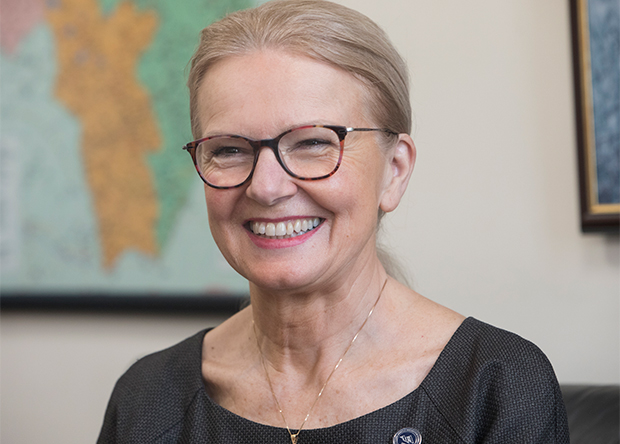 Karin Markides
Karin Markides Photo: Mediamax
The vision is very clear. We keep a systems view and a clear goal, so we can see that our steps are going in the right direction. The most important thing is to build trust with the other universities and other collaborators, because you can never be successful just alone, but you can be the one that invite others. And if you really have an ambition to make a difference in a country like Armenia, you should not think about your own branding, you have to think about the content and how to collaborate. And we are here to build trust and to help and support the whole university system, the whole higher education. We will learn from the others as well, and we have a lot to give, especially the values. After the war, and with all the things that Armenia has to offer, it's really important that we make the next generation believe in the future. We will succeed, we are definitely on the right course of making this country bloom. Of course, we are depending on what's happening around us. But if we can continue and we are allowed to continue, the next generation will see better possibilities in the whole country.
Marie Tarian talked to Karin Markides
Photos: Emin Aristakesyan









